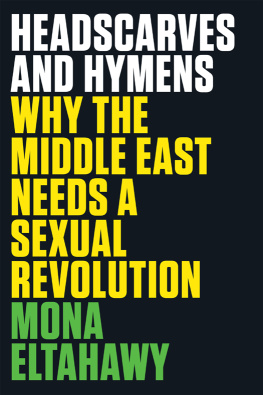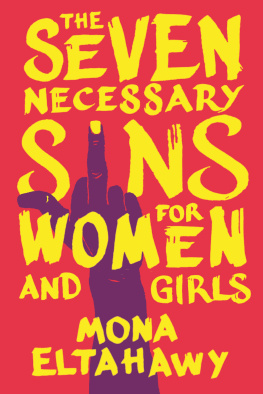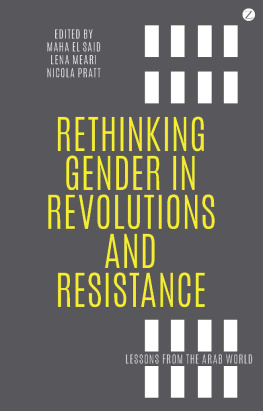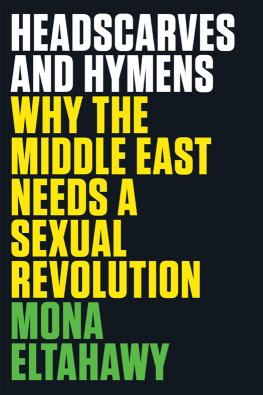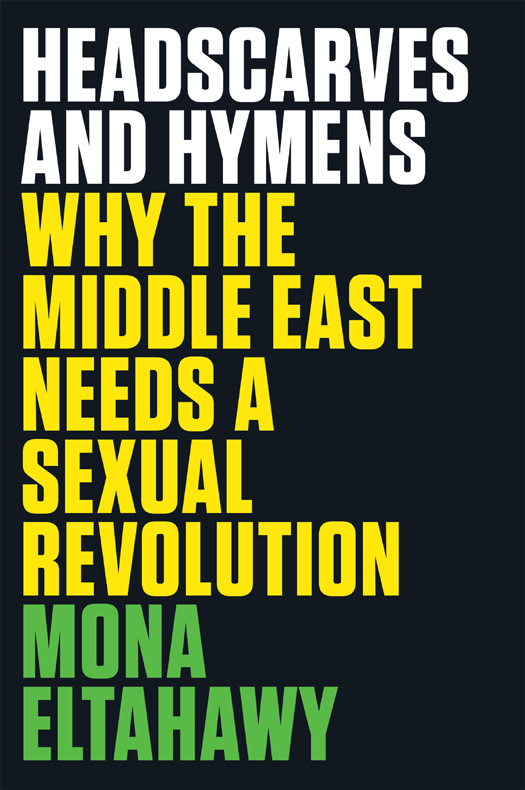HEADSCARVES
AND HYMENS
WHY THE
MIDDLE EAST
NEEDS A SEXUAL
REVOLUTION
MONA ELTAHAWY

To the girls of the Middle East and North Africa: Be immodest, rebel, disobey, and know you deserve to be free
Write with your eyes like painters, with your ears like musicians, with your feet like dancers. You are the truthsayer with quill and torch. Write with your tongues of fire. Dont let the pen banish you from yourself. Dont let the ink coagulate in your pens. Dont let the censor snuff out the spark, nor the gags muffle your voice. Put your shit on the paper.
We are not reconciled to the oppressors who whet their howl on our grief. We are not reconciled.
GLORIA ANZALDA,Speaking in Tongues:
A Letter to Third World Women Writers
I n Distant View of a Minaret, the late and much-neglected Egyptian writer Alifa Rifaat begins her short story with a woman so unmoved during sex with her husband that, as he focuses solely on his pleasure, she notices a spiderweb she must sweep off the ceiling and has time to ruminate on her husbands repeated refusal to prolong intercourse until she climaxes, as though purposely to deprive her. Just before her husband reaches orgasm, the call to prayer interrupts their intercourse, and he rolls over. After washing up, she loses herself in prayer, and looks out onto the street from her balcony. She interrupts her reverie to dutifully prepare coffee for her husband to drink after his nap. Taking it to their bedroom to pour it in front of him, as he prefers, she notices that he is dead. She instructs their son to go get a doctor. She returned to the living room and poured out the coffee for herself. She was surprised at how calm she was, Rifaat writes.
In a crisp three and a half pages of fiction, Rifaat lays out a trifecta of sex, death, and religion that forms the pulsating heart of misogyny in the Middle East. Here is a writer who, when she was alive, was held up by academics as an authentic Egyptian woman, untainted by a foreign languageshe spoke only Arabicand influence from abroad. It is said that Rifaat never traveled outside Egypt, although she did perform a pilgrimage to Mecca and attended a literary conference in the United Kingdom. She was forced by her family to marry a man of their choice, with whom she traveled across Egypt.
Rifaat does not mince words, nor does she mollify. In the slim volume of short stories titled Distant View of a Minaret, she introduces you to a sexually frustrated middle-aged wife who wonders if her mother suffered the same fate with her father, and another mother who laments her youth lost to female genital mutilation and a society that fought her womanhood at every turn. The stories show women constantly sublimating themselves in religion, even as this faith is used against them by clerics and male-dominated society.
There is no sugarcoating it. We Arab women live in a culture that is fundamentally hostile to us, enforced by mens contempt. They dont hate us because of our freedoms, as the tired post-9/11 American clich had it. We have no freedoms because they hate us, as Rifaat powerfully says.
Yes: They hate us. It must be said.
The fact is, theres no joy for a girl in growing up, its just one disaster after another till you end up an old woman whos good for nothing and whos real lucky to find someone to feel sorry for her, Rifaat writes in the story Bahiyyas Eyes.
Some may ask why Im bringing this up now, when the Middle East and North Africa are in turmoil, when people are losing their lives by the thousands, when it can sometimes seem as though the revolutions that began in 2010incited not by the usual hatred of America and Israel, but by a common demand for freedom and dignityhave lost their way. After all, shouldnt everyone receive basic rights first, before women demand special treatment? Also, what does gender or, for that matter, sex have to do with the Arab Spring? It should have everything to do with the revolution. This is our chance to dismantle an entire political and economic system that treats half of humanity like children at best. If not now, when?
Name me an Arab country, and Ill recite a litany of abuses against women occurring in that country, abuses fueled by a toxic mix of culture and religion that few seem willing to disentangle lest they blaspheme or offend. When more than 90 percent of women who have ever married in Egypt have had their genitals cut in the name of purity, then surely we must all blaspheme. When Egyptian women are subjected to humiliating virginity tests merely for speaking out, its no time for silence. When an article in the Egyptian criminal code says that if a woman has been beaten by her husband with good intentions, no punitive damages can be obtained, then to hell with political correctness. And what, pray tell, are good intentions? They are legally deemed to include any beating that is not severe or directed at the face. What all this means is that when it comes to the status of women in the Arab world, its not better than you think. Its much, much worse. Even after these revolutions, women remain covered up and anchored to the home, are denied the simple mobility of getting into their own cars, are forced to get permission from men to travel, and are unable to marry or divorce without a male guardians blessing.
The Arabic-speaking countries of the Middle East and North Africa stand apart in their terrible record on womens rights. Not a single Arab country ranks in the top one hundred positions on the World Economic Forums Global Gender Gap Report, putting the region as a whole solidly at the planets rock bottom. The annual report looks at four key areas: health (life expectancy, etc.), access to education, economic participation (salaries, job types, and seniority), and political engagement. Neighbors Saudi Arabia and Yemen, for instance, are eons apart when it comes to gross domestic product (GDP), but only eight places separate them on the Global Gender Gap Report, with the kingdom at 127 and Yemen coming in at 136, the very bottom of the 2013 index. Morocco, often touted for its progressive family law (a 2005 report by Western experts called it an example for Muslim countries aiming to integrate into modern society), ranks 129th.
Its easy to see why the lowest-ranked country is Yemen, where 49 percent of women are illiterate, 59 percent do not participate in the labor force, and there were no women in parliament as of 2013. Horrific news reports about eight-year-old girls dying on the evening of their wedding to much older men have done little to stem the tide of child marriage there. Instead, demonstrations in support of child marriage outstrip those against it, and clerics declare that opponents of state-sanctioned pedophilia are apostates because the Prophet Mohammed, according to them, married his second wife, Aisha, when she was a child.
At least Yemeni women can drive. It surely hasnt ended their problems, but it symbolizes freedom of mobilityand nowhere does such symbolism resonate more than in Saudi Arabia, where child marriage is also practiced and where grown women are treated like children their entire lives, made to obtain the permission of a male guardian to do the most basic of things. Saudi women far outnumber their male counterparts on university campuses but are reduced to watching far less qualified men control every aspect of their lives.

